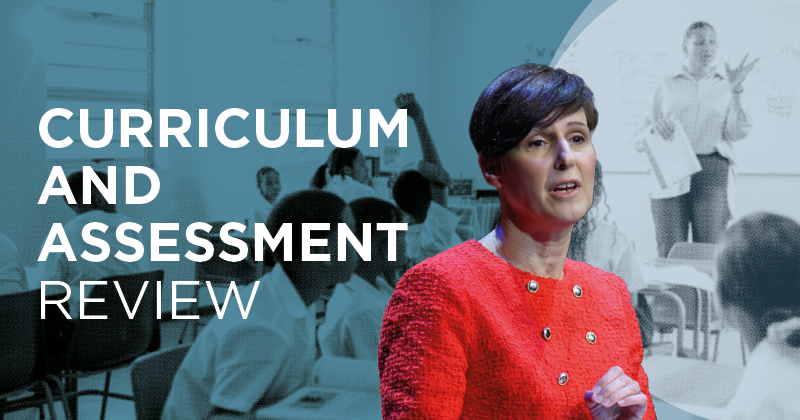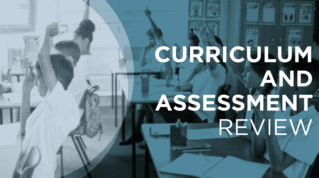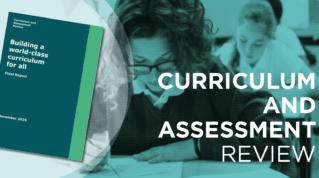Professor Becky Francis has published her final curriculum and assessment review report.
She spoke to Schools Week about some of its key recommendations and the thinking behind them.
(FYI: You can read our news story on the review proposals here, our full round-up of the key policies here, and our round-up of the subject-specific recommendations here)
You can also view the curriculum review in full here.
Question: What are the most important recommendations?
Answer: I think it’s really hard to actually disaggregate, because I think that really they only work in the round.
What we’ve tried to do is a very holistic piece that, as we set out in the interim report, improves across the board. It doesn’t mend things that aren’t broken, but rather builds on that strong foundation and goes hard on areas where we do need improvement.
The one area that I think the review has absolutely prided itself on is the insistence that high standards needs to mean high standards for all young people.
And you’ve seen the multifaceted way that we’ve gone at that on the subject-by-subject approach, as exemplified by the triple science entitlement. Or the directive to encourage all young people to be able to learn a musical instrument and read music and so on.
Labour had promised ‘one of the non-EBacc subjects included in pupils’ progress and attainment 8 should be a creative or vocational subject’. But you haven’t recommended changes to progress 8. Why?
We’ve looked really hard at both the EBacc itself and progress 8 and the different behaviours that are incentivised by both.
We think that progress 8 has a really good balance between academic breadth for all, which is well evidenced to positively impact young people’s life chances. But it allows that extra flex and choice, which shores up engagement, facilitates the arts…and basically allows young people to choose things that are most directly useful for their different future pathways.
Of course, no single performance measure can be perfect, and if you try to lever things in, other things follow from that. You bump out other subjects, or you make things complicated. We thought that the status quo in progress 8 has a really nice balance between breadth and choice.
The challenge has been for schools to get kids to do the EBacc subjects.
By lifting that restrictive stipulation, the assumption is that then young people who would like to take arts, vocational subjects, and indeed the other subjects not currently included in EBacc, will have the choice to do so.
But it would be very strange to force young people to pick an arts [subject], in my view.
You’ve proposed an entitlement to study triple science. What issue are you trying to solve?
There’s really strong evidence that there’s a tight relationship between taking triple science and then progressing to study science at A-level and at undergraduate level.
And sadly, the reverse is also true. There’s also very strong evidence [of] the incredible paucity in the number of young people who take combined science and then go on to study science at A-level.
So given that that has a big impact on young people’s remuneration, access to STEM and so forth, in a decision that’s been taken quite early at school, we think it’s really important that all young people have the chance to access triple science should they want to.
You’re also aware that there’s a very profound gap for social background, according to which kids currently get to take triple science.
Our full curriculum review coverage:
News story: New national curriculum pledged from 2028
What ministers said: which recommendations will now become government policy?
Key policies round-up: Scrap EBacc, year 8 tests in English and maths, cut 10% from GCSE exam time
Subject-specific policy round-up: Mandatory citizenship, RE in the national curriculum and triple science entitlement:
Some science subjects have huge teacher shortages – do you think there’s a capacity issue
It may not be as catastrophic as sometimes perceived, but definitely, there’s an issue in terms of supply of science teachers, particularly in different subject areas, which is why we’ve been quite cautious and in our recommendation.
[We’ve] recommended that this is done over a period of time to allow schools to prepare, but also that the government finds ways to support that preparation as well.
You’ve proposed an English and maths test in year 8. How does this align with the government’s plan for a year 8 reading check?
The reading test is completely separate and not our recommendation, so that just sits outside elsewhere from the review.
What’s interesting, I suppose, is that, by coincidence, the government is focusing on problems in key stage 3 and we are focusing on problems in key stage 3. And then we’ve both come up with a proposition for year 8.
But although there’s a genuine risk, because especially English, reading, sounds a bit the same, actually quite different issues being addressed, and for slightly different reasons.
So in terms of our focus, we are thinking here obviously about the well-known challenges with progression from key stage 2 into key stage 3, and then especially the significantly widening gap for socio economic attainment moving through key stage 3.
So we’re interested in that momentum issue, but also we’re interested in narrowing the pipeline or the funnel of young people that come into their GCSEs age 16 and don’t succeed in a grade 4 or above at maths and English.
So basically, the idea for us with these diagnostic tests is that they’re a tool for teachers, that they are focused on diagnosing problems around core competencies in English, core concepts in maths and that then, when weaknesses are identified, that enables teachers to address those and remediate those before young people move into key stage 4 study.
We recommend that they have to be piloted before any rollout. They have to be got right. We can actually see the risk of unintended consequences if they’re not got right.
You don’t want to see the tests used as an accountability tool?
Our recommendation is that if they these prove effective and useful after piloting, that they become mandatory and nationalised. But no, they wouldn’t be part of performance measures.
The review also talks about encouraging more schools to run the non-statutory key stage 1 assessments. What would you say to criticism over more testing?
I wish we didn’t necessarily have to see it like testing. I get that, of course, if something becomes an accountability measure or is really important for young people’s futures, that high stakes element becomes a stress for everybody.
But assessment is an absolutely essential tool in every practitioner’s portfolio, and must continue to be so.
Something like 60 per cent of schools are already using and actualising the key stage 1 tests. Good for them. We’re just saying this is a nationally available resource, freely available to schools. Why not use it?
Assessment is an absolutely essential tool in every practitioner’s portfolio, and must continue to be so
Nobody wants to suggest that schools wouldn’t want to be making use of formative assessment.
We actually have relatively scant testing compared to many other leading jurisdictions. We’re certainly not overburdened.
The only place where we are an outlier is in the volume of testing at age 16. Only Singapore has anything like how much we do through GCSE.
So you see our recommendations there as well [to cut GCSE exam time by 10 per cent].
Coming back to the year 8 piece, obviously I have no comment on the reading tests. That was never on our horizon when we were suggesting those diagnostic tests.
I suspect that the government won’t do it all. I’ve no idea what will fall out of all of this. But you’re right. It would be strange if suddenly there were loads of tests in year 8.
But we can’t be responsible for that, I don’t think. We’re just focused on our recommendation of diagnostic tests.
And as I said, those are very much conceived as a tool for teachers in otherwise…an unusually long period between SATs and then GCSEs.
You’ve recommended the replacement of the year 6 grammar, punctuation and spelling test. What are your concerns about the test currently?
We heard quite a lot and saw quite a lot of evidence that writing has had less attention than reading, and that actually young people are often struggling more with writing, so this needs attention.
We also heard a lot of concern that the GPS test as stands encourages lots of theoretical memorisation, but actually doesn’t sufficiently test young people’s application and practice.
So the idea of the new test would be that it tests grammar, punctuation and spelling in practice, in young people’s writing.
Obviously, within that, we’re also steering towards less attention to incredibly technical memorisation of terminology and constructs and rather thinking about grammar as successfully applied in writing.
You’ve proposed Ofqual and government seek to reduce GCSE exam time by at least 10 per cent. How might that be achieved?
It depends, subject by subject to some extent, which ironically will probably mean that in practice, some kids are affected more than others.
What we have based the recommendation on is Ofqual’s own modelling, which suggests that exam time at GCSE can be reduced by 10 per cent without a significant trade on reliability.
Once you go beyond 10 per cent things get a bit harder. And so basically, the reason we’ve said at least 10 per cent is that we are hoping that with some of our recommendations on GCSE content and time in our subject by subject recommendations, that that allows a bit more creativity on behalf of Ofqual and the DfE.
But obviously the devil is in the detail there, and it rather depends on implementation as well.
So by saying at least 10 per cent, we think…let’s capitalise on what Ofqual think is immediately doable, and then hopefully there can be a further push for any further reduction.















Applaud more physical activity to ensure good physical development and to help in managing some emotional challenges but why even more competition when research indicates some children and young people are opting out of competitive sport and prefer activities such as dance, swimming, skateboarding and trampoline?